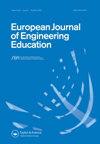对专业真实性、文化相关性和社会技术整合的项目课程设计中教育实践问题的思考
IF 2.8
Q2 EDUCATION & EDUCATIONAL RESEARCH
引用次数: 0
摘要
本文章由计算机程序翻译,如有差异,请以英文原文为准。
Reflections on problems of educational practice in a project course design for professional authenticity, cultural relevance, and sociotechnical integration
ABSTRACT This paper examines specific problems of educational practice that I, an undergraduate engineering educator and education researcher, have encountered in creating an interdisciplinary engineering project course. I reveal my process of theorising about problems of practice to position engineering educators’ pedagogical theorising as worthy of scholarly focus. In a reflective scholarship of teaching and learning paradigm, I take the iterative design of this course as the object of inquiry, across semesters and institutional contexts. I discuss the iteration of five key dimensions of the course: (1) authenticity to engineering professional work, (2) promoting learning of teamwork skills, (3) complexities and equity dimensions of situated project-based learning environments, (4) valuing social sciences and social context reasoning for engineers, and (5) creating a responsive curriculum for students. I distil insights related to each of these dimensions. I conclude with a consideration of the interplay between these dimensions and a reflection on the form of scholarship for engineering education.
求助全文
通过发布文献求助,成功后即可免费获取论文全文。
去求助
来源期刊

European Journal of Engineering Education
EDUCATION & EDUCATIONAL RESEARCH-
CiteScore
7.30
自引率
13.00%
发文量
64
期刊介绍:
European Journal of Engineering Education is published six times a year in print and electronic editions and provides an essential forum for dialogue between researchers and specialists in the field of engineering education, at European and worldwide levels. European Journal of Engineering Education is the Official Journal of SEFI, the Socièté Européenne pour la Formation des Ingénieurs (the European Society for Engineering Education). SEFI is a non-governmental organization whose aims are to develop information about engineering education, to improve communication and exchange between professors, researchers and students and to promote cooperation between the various institutions concerned with engineering education.
 求助内容:
求助内容: 应助结果提醒方式:
应助结果提醒方式:


